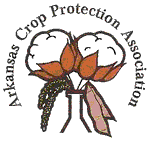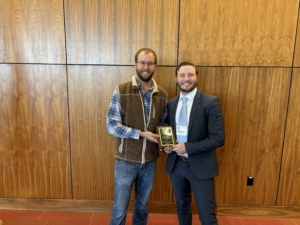Aiden Ross won first place in the undergraduate student competition with a paper titled Determining and Interpreting the Possible Genetic Cause of Halosulfuron Failure on White Margin Sedge. White margin sedge (Cyperus macrostachyos) is an increasing weed of flooded rice in Arkansas. Approaches to control this weed are needed. Following a failure to control several white margin sedge accessions with the acetolactate synthase (ALS)-inhibiting herbicide halosulfuron-methyl, three accessions were selected, and the ALS enzyme-encoding region was sequenced with the objective of identifying any mutations previously correlated with herbicide resistance. A substitution of aspartate 376 (standardized to Arabidopsis thaliana) for glutamate was found in the ALS enzyme of all three populations. The Asp-376-Glu substitution has been documented in several different weed species and is well understood to confer strong resistance to nearly all ALS-inhibiting herbicides. Currently, the best known postemergence control option for white margin sedge is Basagran (2pt/A) as shown by preliminary research. Basagran provided 70% control of white margin sedge two weeks after treatment under greenhouse conditions. More research on possible control options will follow in the upcoming year and screening of additional accessions for sensitivity to ALS-inhibiting herbicides will continue.


